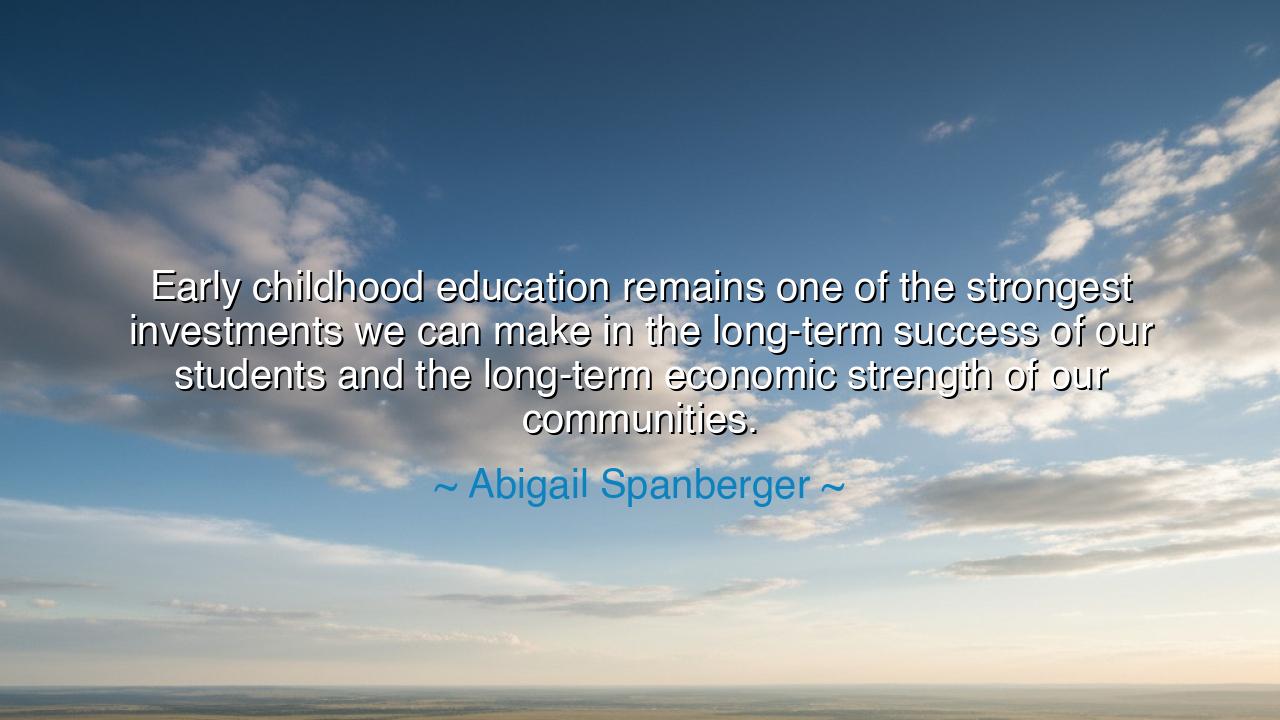
Early childhood education remains one of the strongest
Early childhood education remains one of the strongest investments we can make in the long-term success of our students and the long-term economic strength of our communities.






Hear, O keepers of the future, the words of Abigail Spanberger, who proclaimed: “Early childhood education remains one of the strongest investments we can make in the long-term success of our students and the long-term economic strength of our communities.” In this truth, she gathers together two destinies: the destiny of the child, who grows into the fullness of his or her potential, and the destiny of the community, which flourishes when its members are nurtured from their earliest years. For Spanberger teaches that the foundation of a people’s greatness is laid not in monuments of stone, but in the minds and hearts of its youngest children.
What is early childhood education? It is the tender shaping of the mind in its first years, when curiosity is boundless, when imagination is wild, and when the roots of character are still soft and pliable. In those years, a child learns not only letters and numbers, but the habits of attention, the joy of discovery, the trust in learning. To neglect these years is to leave the soil barren; to invest in them is to plant seeds that will yield harvests for a lifetime.
Spanberger names investment, for she knows that what is given to a child returns a hundredfold. A dollar spent on early education saves many dollars in the future—dollars that would have been spent on poverty, crime, or remedial schooling. Yet beyond material wealth, the true return is the shaping of citizens who can think clearly, work diligently, and love deeply. It is an investment not in mere economics, but in humanity itself.
History gives us testimony. Consider the vision of Maria Montessori, who in the early 20th century opened schools for the poorest children of Rome. She believed that every child carried within them an inner teacher, and that the role of education was to unlock it early. The results were astonishing: children once dismissed as incapable grew into confident, capable learners. The Montessori method spread across the world, proving Spanberger’s truth—that to invest early is to unleash potential that might otherwise be lost forever.
The same wisdom can be seen in nations that have prospered by prioritizing the youngest. Finland, often praised for its schools, places great emphasis on early childhood learning—not only in academics, but in play, creativity, and social growth. The result has been not only high achievement but also a society known for equity, innovation, and resilience. Their story is the living embodiment of Spanberger’s insight: the strength of a community begins with how it treats its youngest.
Yet let us beware the danger of neglect. Where early education is denied, inequality grows, and entire generations may be stunted. Children who begin their schooling already behind often remain behind, not for lack of intelligence, but for lack of opportunity. A society that withholds early investment from its poorest children plants seeds of division and reaps the bitter harvest of injustice. This is why Spanberger calls her people to remember: the strength of a nation rests not in its armies or treasuries, but in the nurturing of its children.
Therefore, O stewards of tomorrow, take this lesson: make the education of the youngest a sacred duty. Parents, read to your children and cultivate their wonder. Teachers, treat the smallest learners not as empty vessels, but as gardens ready to bloom. Leaders, invest resources in preschools, in childcare, in programs that lift the youngest out of poverty and into promise. Communities, surround your children with love, for in their laughter and learning lies your own future.
The final word is this: as Abigail Spanberger has spoken, so must we remember. Early childhood education is not charity, but destiny. It is the wisest investment we can make, for it yields both the flourishing of individuals and the enduring strength of communities. Let us then pour our efforts into the youngest among us, and by doing so, ensure that the light of learning burns brighter in every generation to come.






AAdministratorAdministrator
Welcome, honored guests. Please leave a comment, we will respond soon